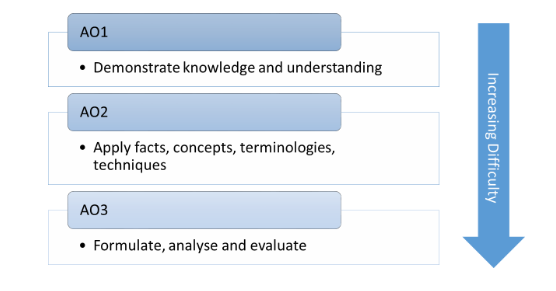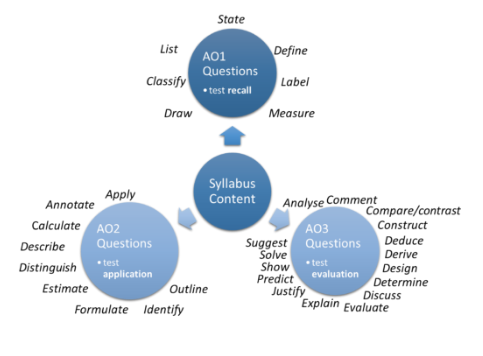Update December 2024. This piece has been up for a number of years. We’ve updated it, tidied things up a bit and made it easier to link between the articles. Best of luck to everyone studying IB DP Chemistry!
This is part two of a three blog series. Steps 1 to 4 were covered in part 1. You can read the other two parts here:
- How to get a Level 7 in IB Diploma Chemistry: Part 2
- How to get a Level 7 in IB Diploma Chemistry: Part 3
5. Test your understanding
As I said last time, understanding must come first. If you want to destroy your confidence and put yourself in a state of panic, an excellent strategy is to prematurely start working through past questions on topics you half-understand.
Once you’ve grasped a concept, you must test your understanding to identify any misconceptions and ensure you’ve completely got it. I recommend end-of- chapter questions from textbooks or revision guides for this. Don’t just answer the question in your head, write it down; talking a good answer is a very different skill from writing one.
If you get a question wrong, make sure you understand why you got it wrong and how to get it right next time. If you can’t figure it out yourself, get somebody to explain it in another way. Make the effort to understand now, otherwise you’ll end up with a depressing list of difficult topics to deal with at revision time!
Another reason why you should constantly test your understanding is because the phrase ‘use it or lose it’ applies to lots of chemistry, especially topics where you go through set procedures, such as calculating K c using ‘ICE’ tables, or organic mechanisms. With lots of chemistry questions, you get good at them through practise and if you keep up the practise, you stay good.
It’s important to track your understanding as you progress through the syllabus, too. An easy approach is to highlight the subject guide using a traffic light system:
- red = don’t understand
- yellow = mostly understand but need to review
- green = completely understand
Do it honestly, and make sure your self-assessment is evidence-based. If buffers make complete sense when you read the revision guide but you get buffers questions wrong, you should mark it yellow, not green.
6. Own your IA
How to write a ‘level 7’ IA is a separate blog article, but a good piece of general advice about the IA is make it your own. Taking ownership of your IB coursework is important in both the Internal Assessment and the Extended Essay. When you read the best IAs, the student’s genuine interest and engagement shine through in the way they selected a topic of relevance to them, injected creativity into the design of their experiments, and steered the project to its conclusions under their own initiative. By contrast, ones where the student picked some random chemistry topic they thought would work well in the lab but had no real interest in are usually as dull to read as they probably were to write.
Ownership isn’t a subjective judgement either; it has its own assessment criterion (Personal Engagement) worth 8% and is also a component of other assessment criteria, including Evaluation and Communication. If you want to score highly in your IA, you have to own it. The IA is worth 20% of the final assessment too, so for the sake of your grade and sanity, pick a project you care about and make sure that comes through loud and clear when you write it up.
7. Keep good notes and review them
Consolidation is teacher-speak for seeing the big picture. It’s what happens when those seemingly unrelated topics fall into place and the world of atoms begins to make sense. The starting point is keeping good notes that you routinely review. I’ve noted that writing reliable notes is a common concern for many students I’ve taught, who often ask me to provide my notes, or check over theirs. The road to reliable notes starts with your lesson notes, which you want to write-up soon after each lesson, ideally that night. ‘Write-up’ means turn your teacher’s words into your own words, adding to them with content from books or reliable online sources. Later on, when you turn them into revision notes, you’ll want to add mark scheme guidance (more about that in a later blog article). As for how to set them out in an order that will be logical when it comes to revise, I advise following the order in the Chemistry Guide, which is also the order in most of the official textbooks. ‘Stoichiometric relationships’ is first, then ‘Atomic structure’, which is made up of topics 2 and the higher level topic 12. You may not be taught topic 12 right after topic 2, but if you combine your notes for these topics, you’ll have everything you need to know about ‘Atomic structure’ in one place.
With your notes written up, you then need to periodically read over them and do some practise questions to keep everything fresh. This will make revision a whole lot easier.
8. Understand how you’ll be assessed
Assessment Objectives (AOs) isn’t the most fascinating topic but nonetheless, something every IB student should know about. AOs describe what you need to do throughout the course to obtain the Diploma. There are three AOs related to written exams and they’re arranged in order of increasing difficulty as shown below:

AOs are linked to command words as shown below.

Command words are important because they tell you what you need to do to answer a certain exam question, which means for a start you need to know your command words because if a question asks you to Evaluate and you’ve just Calculated, you’re not going to score full marks. (They’re at the back of the Chemistry guide by the way.)
The relationship between AOs, their difficulty, and command words is important because it’s how questions of varying difficulty are generated. The logic is it’s harder to describe something than define it, and harder still to evaluate it.
What this leads to is different types of question. You have basic knowledge recall questions (mostly testing AO1), application questions (testing AO1+AO2), and harder questions that deal with command words linked to AO3. The hardest of these – called discriminating questions because they separate level 6 candidates from level 7 candidates – are often novel and force you to apply your understanding in unfamiliar contexts.
If you look at the weighting of AOs across the different exam papers, you find that:
- Only 25 % of questions test knowledge recall
- The remaining 75 % test application of knowledge
- 50 % of questions test your ability to formulate, analyse and evaluate
It’s easy to see from this that IB success is not a memory game. Also, the toughest questions are novel and so can’t be prepared for by learning mark schemes. Learning and understanding is essential.
In the final part, we’ll look at how to use past papers effectively, how to interpret mark schemes, and the importance of feedback. Ready for the last part?
